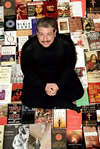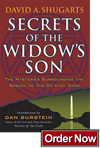RANDOM THOUGHTS ABOUT THE DA VINCI CODE MOVIE--COMING VERY SOONIn this post are excerpts from an interview I did with journalist Erik Floren, who interviewed me last week for the Edmonton Sun, a newspaper in Canada. The article ran on Sunday. It has a pretty good set of quotes from me about my views on the upcoming Da Vinci Code movie and the phenomenon surrounding it. I hope you find it of interest. The weblink for the full text of the article is:
http://www.edmontonsun.com/Entertainment/Spotlight/2006/05/14/1579185-sun.html
May 14, 2006
Da thriller in theatres
Author of unauthorized guide dispels myths as big screen version of book makes debut
By ERIK FLOREN, EDMONTON SUN
You read the book - now you eagerly await the movie.
You're certainly not alone.
With more than 46 million copies of The Da Vinci Code in print worldwide, Dan Brown's controversial thriller appears to have a built-in audience for the theatrical release on Friday.
The runaway literary blockbuster could easily translate into the runaway movie blockbuster of the summer.
Or even bigger.
"I'm expecting the film to be perhaps the biggest grossing film of all time," said The Da Vinci Code expert Dan Burstein, reached by telephone at his Connecticut office.
Burstein is the editor of Secrets of the Code: The Unauthorized Guide to the Mysteries Behind The Da Vinci Code, the world's No. 1 bestselling guide to the book. As an authority with a non-religious perspective, Burstein has been interviewed extensively, including appearances on the History Channel, Inside Edition and in Forbes and The Washington Post.
"With 40 million buyers worldwide of the book, you can imagine the film is going to be seen by even more people," said Burstein, who predicts the motion picture could eventually surpass the box-office earnings of The Titanic.
"The fact is, the movie is going to be very controversial and get a huge amount of media - probably as much or more as Mel Gibson's Passion of the Christ two years ago," said Burstein.
"It will be shown in almost every country in the world and it cuts across demographics and age and racial lines. I've rarely known of a movie that had so much potential to address so many different demographic niches simultaneously."
In the publishing world, The Da Vinci Code has become its own industry. At last count there were more than two dozen books featuring some form of the The Da Vinci Code in their title, cashing in on the enormous popularity of the novel.
Despite coming out in print four years ago, The Da Vinci Code continues to sell like no other novel, and still sits atop many international bestseller lists. Then again -in addition to being a rip-roaring read - the book has generated tonnes of publicity, no small part due to controversial allegations about the Bible, Jesus Christ and the early history of Christianity.
Especially controversial is the proposal that Jesus Christ and Mary Magdalene married and sired a dynastic bloodline - and that it was covered up by the Catholic Church.
Not surprising then, although the work is labelled as fiction, the Vatican has not been amused. In its latest broadside, Monsignor Angelo Amato blasted The Da Vinci Code as full of anti-Christian lies. Amato, the No. 2 man in the Vatican's powerful doctrine agency, urged Catholics to boycott the movie.
Other Vatican officials also called for boycotts of the book last year, suggesting The Da Vinci Code espouses heresy. But that's all just a tempest in a theological teapot, insists Burstein.
"The great quote from a bishop used by Dan Brown in his speeches, is if you look at everything the Catholic Church has withstood over the last 2,000 years - from Roman suppression to the Reformation to everything else - I think it can withstand the criticism of a novelist from New Hampshire," he laughed.
"And if The Da Vinci Code is shaking people's faith, the church has to engage in that issue, and ask, why? Because amid all the fiction and fantasy in The Da Vinci Code, there's some pretty provocative issues about the role of women in the church, about why Mary Magdalene was known as a prostitute for 1,500 years and about why these alternative gospels were suppressed (from the Bible) 1,800 years ago," said Burstein.
"These are very legitimate questions that should be discussed and debated." Those very questions are the reason Burstein - whose day job is managing a venture capital firm in New York - decided to publish Secrets of the Code.
"I was a fan of The Da Vinci Code and found it fascinating on many levels. I wanted to know more about the issues, and did my own independent research. There was so much debate about what's real and what's not in The Da Vinci Code - I wanted to go on the hunt," he said.
What Burstein found during his hunt was lots of errors big and small in The Da Vinci Code on matters of fact. What has everyone debating is actually very subjective matters of religion and theology - where there is no truth.
"If you're a highly religious person and you believe The Bible is the literal word of God, then obviously you're going to think that's a fact. But the fact that you believe that doesn't make it a fact," said Burstein.
While Burstein doesn't suspect any hidden agenda, he does think the writer was motivated by two strong beliefs.
"The first is Brown's belief that even though we live in the information age, there are powerful people in society that like to keep certain important truths from being widely known.
"What (Brown) also believes, I think very deeply, is that we are not aware of how much the original message of Jesus - the human being, the anti-Roman Jewish revolutionary who favoured the oppressed and the poor and the downtrodden and the women and the people of darker skin - got convoluted, changed and corrupted when Christianity became the state religion of the Roman Empire of Constantine."
As with the book, Burstein feels his Secrets of the Code - a collection of original thought and writing from key authors and scholars active in their fields - will serve as an interesting companion to the movie, but recommends first seeing the film.
"If you come out of the theatre asking a lot of questions and wanting to know what you've just seen, you should definitely pick up a copy of our book. It will shed a lot of light.
"I also will not be surprised if a lot of the people who like the book are disappointed with the film, because I think it's very, very difficult in film to capture many of these bigger issues."
The special effects used in the Harry Potter movies made many parts of the book come alive on screen; but that won't be a luxury afforded with The Da Vinci Code movie, he speculated.
"A lot of the things that make the book most interesting is really mental and intellectual, and it's quite difficult to bring those things to life (with special effects)," said Burstein.
Still, those very issues and ideas are likely magical enough in themselves, having already helped launch The Da Vinci Code into a global phenomenon.
Indeed, a book selling 40 million copies is no ordinary novel. And the impact of The Da Vinci Code on our collective pop-cultural psyche is still growing. For this motion picture should reach even more people, further advancing the issues and ideas. So just how much is truth, and how much fiction?
"I think the truths are big and important - but metaphorical - they are not fact truths," said Burstein.
"We don't know that Jesus or Mary Magdalene were ever married. But the idea that they might have had a different kind of relationship than the one traditionally described is a very powerful one worth considering," he added.
"The stuff (in the novel) about the Priory of Sion is all made up, taken from a now very well-known documented 20th-century French hoax created by Pierre Plantard - and the stuff that's in the book The Holy Blood and the Holy Grail and was the basis for the London lawsuit."
That much-publicized court battle kept The Da Vinci Code in the news. London's High Court cleared Brown of copyright infringement last month, mere weeks before the movie was to open. British authors Michael Baigent and Richard Leigh had sued Brown, alleging his novel "appropriated the architecture" of their 1982 work The Holy Blood and the Holy Grail.
Both books explore the theory that Jesus married Mary Magdalene, had children and his bloodline survives today.
"The irony about the Priory of Sion is that it's a hoax. Nobody should have a copyright to it because there's not even a shred of truth to it," laughed Burstein. "That there's a Priory of Sion going around today that has this long-term intellectual legacy that goes back to Leonardo Da Vinci is just a concoction.
"But it's interesting to consider because the people put into it - like Leonardo and Isaac Newton and Victor Hugo and Claude DeBussy and Mozart - were all one type of heretic or another. All of them believed in some kind of magical alchemical spiritual truths that were more important than, you know, common experience of science and nature and logic. And that's true. That's why they were included," said Burstein.
"So it's still an interesting idea to think about, but it's fundamentally false," said Burstein.
Isn't that the bottom line to The Da Vinci Code? That, whether book or movie, it is interesting to contemplate?
"Exactly. And that's what our book is all about, taking the people who want to think about those things and allowing them the materials and space to extend the conversation."
 Dan Burstein launched Squibnocket Partners as an innovative creative content development company in 2003 with his business partner, Arne J. de Keijzer. In 2004, they created the Secrets series, which, in addition to Secrets of the Code (first published in 2004), now includes Secrets of Angels & Demons (2004), Secrets of the Widow's Son (2005), and Secrets of Mary Magdalene (fall of 2006). Secrets books have found a place as the leading secular multiperspective guidebooks, appearing on the New York Times, Publisher's Weekly, USA Today, and Wall Street Journal bestseller lists, as well as other bestseller lists around the world. Taken together, the Secrets books now have more than two million copies in print in twenty-eight countries. A documentary film based on Secrets of the Code is currently in the works.
(
Dan Burstein launched Squibnocket Partners as an innovative creative content development company in 2003 with his business partner, Arne J. de Keijzer. In 2004, they created the Secrets series, which, in addition to Secrets of the Code (first published in 2004), now includes Secrets of Angels & Demons (2004), Secrets of the Widow's Son (2005), and Secrets of Mary Magdalene (fall of 2006). Secrets books have found a place as the leading secular multiperspective guidebooks, appearing on the New York Times, Publisher's Weekly, USA Today, and Wall Street Journal bestseller lists, as well as other bestseller lists around the world. Taken together, the Secrets books now have more than two million copies in print in twenty-eight countries. A documentary film based on Secrets of the Code is currently in the works.
(



